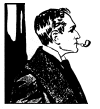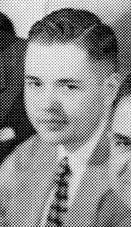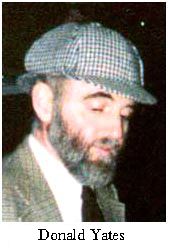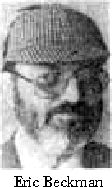The Original Greek Interpreters

On Monday, April 16, 1945, a half-dozen students and the professor of their English literature class at Michigan State College in East Lansing, MI took the momentous step of forming the fifth "scion society," or offshoot of the Baker Street Irregulars of New York, in the U.S.-- and the first academically based scion. Prof. Robert P. Adams had been a member of the Scandalous Bohemians of Akron and assigned The Adventures of Sherlock Holmes to his class-- one of the students, Page Heldenbrand, likewise being a Scandalous Bohemian. Enthusiasm grew, as the State News, the student newspaper, reported on April 19 (in the process misspelling Heldenbrand's name, a journalistic practice which has sadly not disappeared in intervening years). The group decided that as the Michigan State team mascot was the "Spartans," that made them "Greek," and their mission was to "Interpret" the sacred writings about Holmes. Prof. Adams was dubbed "Diogenes," apparently in hopes that he could locate some honesty among the membership, while other officers were named to the posts of "Chief Interpreter," "Slate," "Pencil," and "Porter." Of the 6 students named in the State News article, 4 were women, indicating that the Greek Interpreters from their earliest days adopted the gender-nondiscrimination policy which the Baker Street Irregulars only emulated some 45 years later.

The first report of the new scion society in the Baker Street Journal (Vol. 1, No. 3 (OS), September, 1946) described both these heady beginnings and a subsequent state of hibernation. The group met between April and June, 1945, but the fall semester found Prof. Adams on leave to pursue research off campus, and "Chief Interpreter" Heldenbrand had graduated and enlisted in the Navy. The main fruit of those early meetings was a Sherlockian pastiche, "The Singular Affair of Mr. Phillip Phot," which was duly published with the byline, "by the Greek Interpreters of East Lansing, compiled by Page Heldenbrand," in the Baker Street Journal of March, 1947. The pastiche draws heavily on events of the just-finished World War.
While the Greek Interpreters made no more appearances among the scion society reports in the BSJ of this period, and Prof. Adams was no longer heard from, Page Heldenbrand remained active in the Baker Street Irregulars of New York during the late 40s and early 50s-- dutifully listing his affiiation as "The Greek Interpreters of East Lansing." He is shown in photos of the BSI annual dinner for 1949 and 1950 (on the right), and was honored with the investiture "Charles Augustus Milverton" in 1951. His premature death (no date was given in the obituary that appeared in the December, 1965 BSJ) deprived both the BSI and the Interpreters of a major source of energy and ideas.
The Donald Yates Era
The next notice of the Interpreters appears in the BSJ, vol. 10 (NS), April 1960. In the meantime, Michigan State College had swelled in size as returning servicemen took advantage of the GI bill to complete their college degrees, and had become Michigan State University in 1955. Among the new faculty hired was Donald A. Yates, a professor of Spanish who would later specialize in the works of Jorge Luis Borges. Yates had been inducted into Sherlockian mysteries at the hands of the Amateur Mendicant Society of Detroit, and resolved to resurrect the scion society in his new home town. He found two other cast-off Sherlockians in East Lansing, and the early dinners of the newly restored Greek Interpreters seem to have included 4 people besides Yates, of whom the two names most commonly recorded were George Hough and Jim Stokely, both professors of journalism. A dinner in January, 1960, at a Lansing eatery called Cavanaugh's was the first officially recorded event in this phase of the scion's history. Yates dubbed himself the "Melas" of the group, and the other members were named Salem, Selma, Lames, and Melsa-- a practice that was soon discontinued as membership grew.

During these years the traditions of the Greek Interpreters were put in place. Meetings were typically held three times a year (fall, winter, spring) at a local restaurant where liquor was served. (The town of East Lansing was officially "dry" for many of these years, causing the group to eschew meeting inside its own official city of residence.) Four Canonical toasts would be offered-- to The Woman, Mrs. Hudson, Mycroft, and the Second Mrs. Watson. A quiz, usually concocted by Melas, tested the members' wits, and the meeting would close with a reading of the sonnet "221B" by Vincent Starrett, and the singing of "God Save the Queen." Yates had obtained an autograph copy of Starrett's poem, and this treasure, framed with a photograph of Starrett, remains a prized possession of the Scion.
On October 23, 1974, the Interpreters hosted an unprecedented regional meeting of Midwest scions. Forty people attended, including emissaries of Hugo's Companions and the Criterion Club of Chicago, and from the newly formed scion in near-by Ann Arbor, the Arcadia Mixture. Sadly, Yates was the only representative of the formerly-very-active Amateur Mendicant Society of Detroit. The following March, the Interpreters celebrated their 30th anniversary. Twenty-six members signed a roll commemorating the event.
Yates was active in the BSI and contributed several articles to the BSJ. In 1972 he was given the investiture "Mr. Melas," which was supplanted by the more prestigious "The Greek Interpreter" in 1981, and he went on to receive the BSI's coveted Two Shilling Award. Under Yates's urging and sponsorship, four other members of the Greek Interpreters traveled to New York and received BSI investitures: Jeffrey Montgomery ("Inspector Montgomery," 1979); Howard Brody ("Anstruther," 1981); Ralph Turner ("Col. Carruthers," 1983); and Erik Beckman ("Stapleton," 1986).
In later years, Don's wife, Joanne, took over quiz-writing duties.
Times of Turbulence
In the early 1980's, Don and Joanne Yates announced their intention to retire from teaching at Michigan State and move to St. Helena, California. Once established, Don lost no time in founding a new scion, the Napa Valley Napoleons.


A possible heir apparent was Howard Brody, who had left Michigan State for a three-year period in 1977-80, to do his family practice residency at the University of Virginia, and while there had founded The Game Is Afoot in Charlottesville, Virginia. Unfortunately, Brody found that his role as a medical school faculty member left him time to prepare programs and quizzes and emcee the meetings, but not to do the work of negotiating with restaurants, collecting costs of dinner from the members, and so forth. After some time without any meetings, Erik Beckman of the School of Criminal Justice came forward to fill Yates's shoes, and was dubbed the Interpreters' "Life Preserver" for his efforts. Under this tutelage, the Greek Interpreters celebrated their 40th anniversary (somewhat delayed) in February, 1986. Brody helped to compile a commemorative booklet, and a celebratory roll was signed by 36 members.
Unfortunately, the same congenial climes of California which had wooed away the Yateses worked their charms on Beckman, and he also moved to St. Helena in 1987. Gary Reed next took over the organization tasks of the Interpreters, and began to hold meetings at the historic Turner-Dodge mansion in Lansing. Ambitious plans were begun to redecorate one room of that mansion as a replica of the study at 221B. But Reed soon developed competing interests and dropped out.
After another hiatus, the active core of the organization assembled to plan a better strategy to assure timely meetings. This involved, besides Brody, Ralph Turner, Etta Abrahams, Shari Conroy, and Charlie Press. Turner, one of the most distinguished criminologists at Michigan State, contributed some leadership before his unfortunate death. Eventually a division of labor was worked out with Press and Conroy handling the arrangements for dinner, the notices, and the programs; Abrahams writing the quiz, and Brody serving as emcee for the meeting. Under this arrangement the Interpreters celebrated their 50th anniversary in 1995, welcoming back their former Melas, Don Yates, from the Napa Valley. Press compiled a new commemorative booklet which filled in some of the important gaps left from the 1986 work. The shared leadership of the group seems still to be going strong as of this writing, and the fruits of the recent efforts can be seen elsewhere on this website.
--Compiled by Howard Brody, "Foulest Antecedent"
June 2000